Slouching against the yellow-stoned walls of the open penitentiary that shared a wall with Thatta’s Central Jail, Allah Dino feels trapped. When he closes his eyes to sleep, he still hears the cries of his fellow villagers as their families and loved ones were swept away by the floodwaters that killed hundreds of people in southern Sindh last month.
“We left our village with nothing but the wet clothes on our backs,” he tells me while trying to clean a mud stain off of his kurta, tears in his eyes. Allah Dino has been staying at the flood-relief camp in Makli for five days now, but the eerie prison setting with bars on some windows makes him feel like a hostage.
Like Allah Dino, many of those finding refuge in the open penitentiary camp are haunted by what they saw, what they lost, and where they are now.
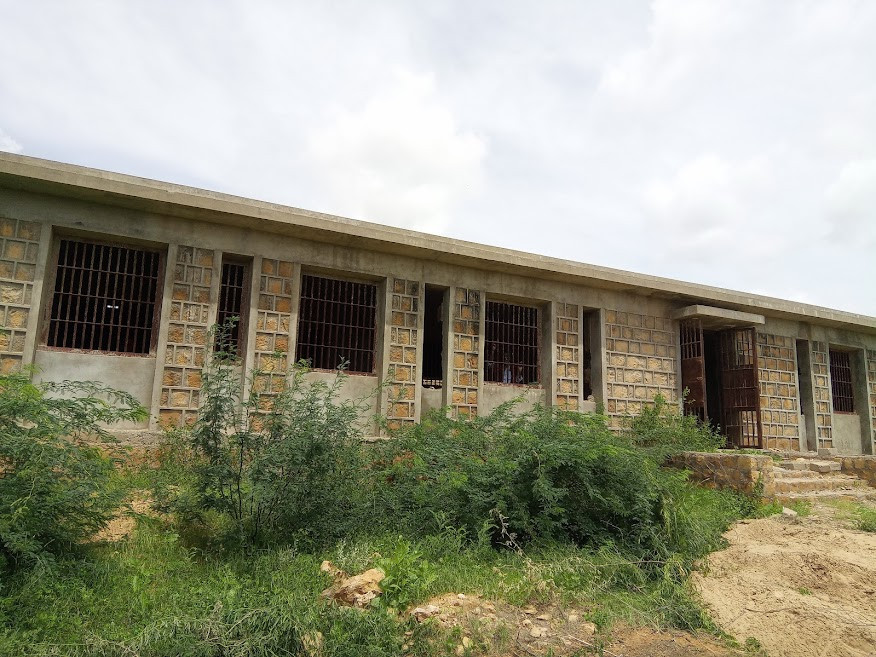
As heavy rains continue to lash parts of Pakistan, at least 350 people have died in Sindh alone. Describing the chaotic night they were rescued by the armed forces, some wept, while the rest fought back the tears that had started to mist their eyes. When I asked him about his village, Shakeel, a displaced person, said, “Around seventy, eighty homes in my village have completely been washed away by the floodwater. The day we left, my entire village was submerged. I could only see clothes and chadors floating in the water.”
At the camp, thin sheets called rallis lined some of the floors where flood victims lay restless while young children wandered around, undraped and barefoot, asking the volunteers for food and water.
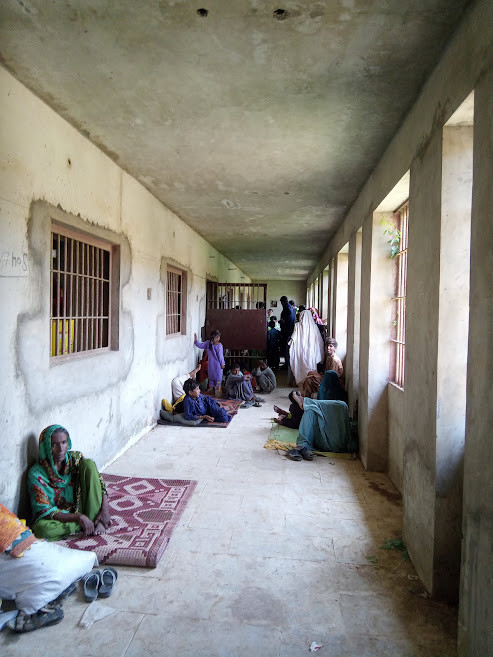
As I walked towards the zenana side of the camp with my phone in my hand, many women veiled their faces and tried to wrap their children in the chadors they were wearing. I was told that women were not allowed to speak against any institutions, so they only mourned the loss of their homes and lamented about the rotten food they were being served.
“The night we left the village, it looked like it was on boiling water,” said Najma*, who had an unclothed two-month baby in her arms. “Graveyards, schools, mosques—all had four feet of water in them, and it was still raining heavily.”
As I walked through the muddy, narrow path leading me from one open-prison row to another, seven children who did not speak my language followed me in hopes of being fed. One clung onto my dupatta and stared nibbling on it. “We have shelter now, but nothing else,” said Bakhtawar as she picked the child up and showed me a steel cup with greyish-green water in it. “This is what they are giving us! They are giving us rainwater to drink; the food they send us is inedible, it is putrid. Everyone who eats the food is sick, all the children in the camp have diarrhoea,” she lamented.
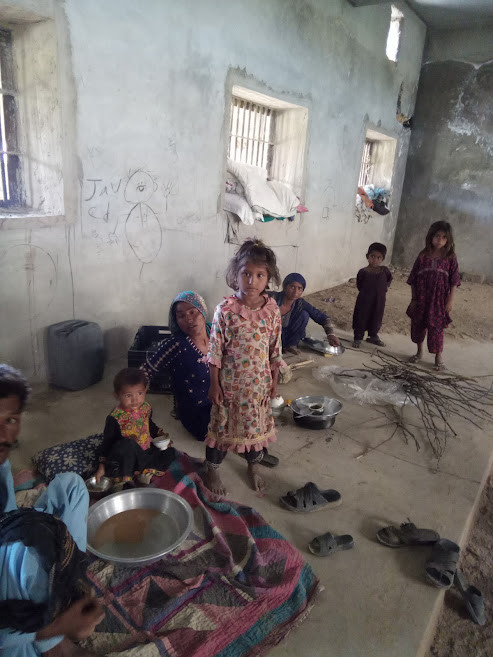
The mobile camp in Makli is home to about 300 people who were left homeless by the flooding in Sindh. The rescued people in the camp are from these settlements: Ghorabari Village, Sajawal Village, Jaati Village, Sagiro Village, Maihar Village, Badin Village, Yar Mohammad Jamri Village and Marka Village.
Some villagers from the Ghorabari region in Sindh say that their families were marooned for over two weeks before they were rescued by armed forces personnel, while others say their neighbours are still missing. “So many of my fellow villagers had drowned; there was water for as far as my eyes could see, and no help from the government. We thought we would die. We were brought here at the Thatta Jail after we had lost everything,” a young boy told me.
For now, a few men wearing uniforms and a handful of volunteers from the Omair Sana Foundation were the only hope these flood victims had.
‘Why did they bring us here?’
At the relief camp in Makli, hundreds of displaced people face an acute shortage of food, drinking water and medicines. According to a report released by the health officials on Thursday, more than 90,000 diarrhoea cases were reported from Sindh in the past twenty-four hours.
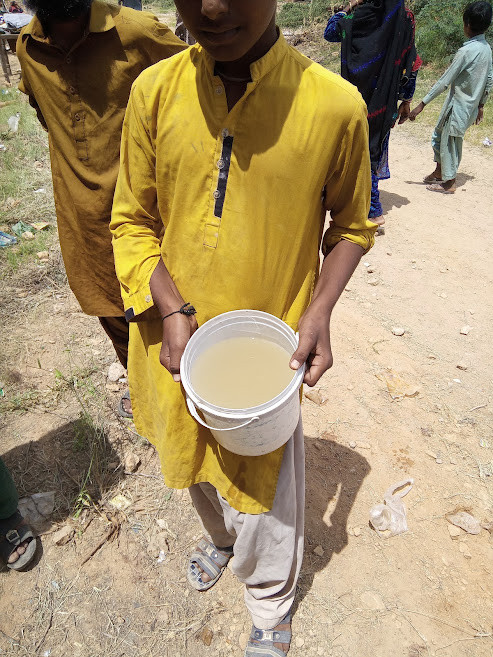
Sharing the ralli on which Bakhtwar sat, her friend piped in, “You can see there are no fans here. There is no electricity, no mosquito nets, no bedding, no sanitation. Why did they bring us here if this place had nothing?”
As she spoke to me, muffled sobs of women and children echoed through the penitentiary. But grief had taken a backseat for some of these women who were very angry and refused to talk to me when I said I did not have any update on when the government would provide them with relief.
A lot of the flood victims at the camp were refusing medical care. Some were saying they will only take medicine once they are given ration packets, while others had given up on their health and said they did not want to live as prisoners. “Many are traumatised, while others feel defeated and unable to rebuild their lives,” said an NGO worker when I asked him about why some of them were refusing medical care. “We are trying our best, but there are so many people and we have limited resources,” he said.
Commenting on the sanitation issues, NGO workers said they were trying to filter the dirty water that was being sent to the camps with the seemingly rotten food. Unfortunately, there was no way to fix the food because the food that was being delivered to the camps was already cooked.
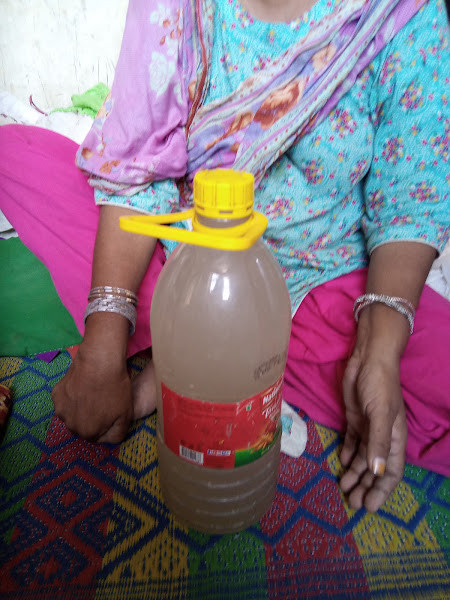
‘We are abandoned’
As they fled from their flood-ravaged villages, many of these flood victims tried to contact the parliamentarians they voted for. And while many of them are busy calling the deadly flooding 'a serious climate catastrophe' and collecting funds for relief, none of them has visited the camp in Makli so far.
“While we are displaced, crying for help, feudal men we voted for are sitting in their mansions. They do not care about us, they have abandoned us. Ali Hassan Zardari visits us every four years at the time of the elections. Where is he now? He has not shown his face to us even once. Our villages are gone, our homes are gone. Where is he?” Shakeel asked.
A few angry men gathered around me when their fellow comrade started talking about the government and its lack of support. “They take our votes and make promises, but they have deserted us when we need them the most. I saw a government helicopter flying the other day; they dropped some ration packets, but they dropped them on dirty grounds. The parcels burst open as they fell to the ground, everything was wasted. They are not helping us. They are making fun of our misery by delivering relief like this,” said Mala*.
After talking to the people in the camps and taking notes in my little red book for two hours straight, a volunteer from the Omair Sana Foundation offered me clean cold water. I felt guilty as the bottle exchanged hands, so I asked why the villagers were not getting that special treatment. I was told they had distributed all the water they had brought with them, which was around two bottles per family, but they were mainly a medical camp, so their principal priority was to provide them with medicines and medical care.
“A few independent volunteers from Karachi have also visited and brought water and basic supplies for the people, but I have not seen anyone from the provincial government in the last few days I have been volunteering here. Army jawans rescue them from their flood-ridden villages and bring them here; at least that is what I have seen,” he said.
Rehabilitation or incarceration?
The eerie location of the rescue camp was not lost on the flood victims.
“Our lives are no better than those of prisoners. We are not rescued, we are jailed,” said Saima*, an angry mother of a three-year-old who had gotten extremely sick because of the rotten food they were being served. “My child has fever and diarrhoea. He ate the foul-smelling food that was served to us last night because we had not eaten in four days, and he is sick since the morning,” she said.
The flood victims say that they are being served rotten food and contaminated water but when they rebel, armed men tell them to stop creating a ruckus and escort them back to their assigned spots.
“Army men are busy rescuing us, but the government should give us proper food and water,” piped in another mother whose children were chewing on rocks and leaves.
While speaking to a soldier on the matter, he agreed that there was a scarcity of resources and clean water but said that people were being given food. “We provide them with food twice a day but some of them say it’s rotten and throw it away,” he said.
A doctor residing at the camp said that almost everyone at the camp was eating gutka and that one of the reasons why they were unable to eat the food that was given to them could be because the gutka had given them oral diseases, which was making it difficult for them to eat anything other than what they were used to eating.
Many flood victims also narrated the stories of how their families worked hard to build their homes after the 2010 floods with no help from the government and the same cycle was going to go on for years to come. “Our government is not capable of rehabilitation, but they can at least give us edible food and water,” wept Liaquat, who was a staunch patriot before his village in Sajawal was washed away, and no one came to rescue him despite him knowing a few people in the government.
Haji Hayat Raees said, “We came here in an army car with nothing but clothes on our backs, but it has been three days now - we have not changed our clothes. We need to offer the Friday prayer, but we cannot do it in dirty clothes.” He was hoping for divine intervention.
While many lamented the loss of their homes and their fellow villagers, some are filled with regret. They try to rationalise their unfathomable plight by saying God was angry with them.

Record monsoon rains and melting glaciers in northern mountains brought floods that have killed at least 1,300 people since June. Several districts of Sindh, Balochistan and southern Punjab are completely inundated with water everywhere in sight.
As Pakistan struggles to respond to the floods that have wreaked havoc in the country, the government has said thirty-three million people have been affected. Some relief operations are underway, but for now, life continues to be miserable.
[*Names have been changed to maintain confidentiality]
